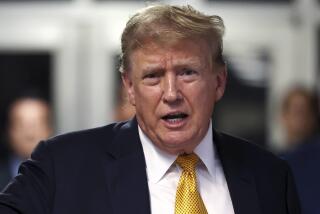U.S. Offers Biting Response to Rostenkowski’s Defense
- Share via
WASHINGTON — In the pretrial war of words in the case against Rep. Dan Rostenkowski (D-Ill.), prosecutors depicted the former Ways and Means Committee chairman as a common thief trying to hide behind lofty constitutional principles to avoid being held accountable for stealing from taxpayers.
Using biting, sometimes sarcastic arguments, the team of prosecutors, led by Assistant U.S. Atty. John M. Campbell, said Rostenkowski is trying to argue that he is above the law by invoking complex constitutional tenets as reasons to dismiss the indictment.
To them, Rostenkowski is arguing that “the Constitution places the whole question of whether he systematically looted the public treasury beyond the reach of the criminal law.”
“Ironically, these efforts by the defendant to shelter his conduct behind a legislative privilege are undercut by the sheer ordinariness of the crimes with which he is charged. He is accused, at bottom, of stealing money,” the prosecutors said in court papers filed late Friday in U.S. District Court in Washington.
Rostenkowski is charged with engaging in a pattern of corrupt activities that spanned three decades. He is accused of using congressional funds to buy personal gifts, hiring ghost workers, using official cars as his own and cashing in office stamps at the House post office. No trial date has been set.
In motions filed last month with U.S. District Judge Norma Holloway Johnson, Rostenkowski’s lawyers, led by Dan K. Webb of Chicago, argued that the 17-count corruption indictment should be dismissed because it violates the Constitution’s guarantee of separation of powers.
Specifically, the defense is relying on the rule-making and speech-and-debate clauses. The rule-making clause allows Congress to make and enforce its own rules. The speech-and-debate clause protects lawmakers from being questioned about their legislative acts. The Chicago lawmaker’s attorneys also argued that much of the indictment relies on Congress’ rules on hiring and expenditures, and it is improper for others to interpret them.
More to Read
Get the L.A. Times Politics newsletter
Deeply reported insights into legislation, politics and policy from Sacramento, Washington and beyond. In your inbox twice per week.
You may occasionally receive promotional content from the Los Angeles Times.









